The first album I ever listened to was Green Day’s American Idiot, which was surreptitiously packaged and handed to me in CD-form by my friend Cameron at my fourth-grade birthday party (along with International Superhits and a blue clear-point mechanical pencil, making this a triple dimebag score). Shocking as it may seem given my writing style, I do come from the era where CDs rather than Playboy’s were being smuggled. As someone whose musical knowledge at that point consisted of the stepping stones of classical piano, I immediately realized why bands have groupies and am glad that I didn’t pick up an electric guitar until a tepid summer in my mid 20s — it’s way, way too much fun to play, and I would never have discovered the Faustian trap of the finer things in my life and how to find them otherwise. To this day, I still know every word of every song from Dookie up to 21st Century Breakdown, which is where it finally hit me that this band was destined to become cringe (as if the concept of the “rock opera” wasn’t already at the time), and I needed to conceal my fandom. Nowadays, I consider Green Day a kind of self-satirizing performance art — the band that wrote
One nation controlled by the media
Information age of hysteria
It's calling out to idiot America
ended up on the same side as Dick Cheney, the man whose life the song purportedly came to reflect, during the 2024 campaign season. The complexities of the world can’t be reduced to sophist stanzas set to four-chord pop rock, but it’s certainly fun to look back, especially given that my life mostly revolves around seeing green nowadays.
Every aesthete has to have a break from the obsessive, curative persona to truly justify their taste — David Foster Wallace was obsessed with cheesy self-help novels, and I have basic pop music. I’ve written a fair bit about how I genuinely enjoy Taylor Swift and mused about the intricacies of classically-trained musicians who switch styles (Lady Gaga is a favorite, but metal and dubstep are full of these types.) I wholly subscribe to the theory that if you are listening to music as you work, your work isn’t intellectually hefty (and it’s worth training yourself to not rely on that crutch),
but pop music is almost perfectly constructed for mindless looping. (Not infrequently, the “drafting” process for writing a post involves a song looping a few dozen times while I figure out how to frame and generalize the thoughts I’m having.) In a sense, great lyrics and songs are about pattern recognition — the way people find “meaning” in songs is a function of the artist generalizing a personal anecdote into a relatable one. For example, I would say that
Do you have the time to listen to me whine?
About nothing and everything, all at once
I am one of those melodramatic fools
Neurotic to the bone, no doubt about it
aptly sums up the Kafkaesque existence of managing money — I can’t stick my head in the sand because so much about handling risk is exposing yourself to as wide of an information base as possible, but talking yourself out of existential dread is a requisite facet of staying long that amounts to making everyone around you depressed.
Gregor Samsa woke up one day to find himself transformed into a portfolio manager. As he grows accustomed to his newfound state, he realizes that his returns came from rationally inducing depression about the state of the world into everyone as a way to not panic and overreact. Then everyone stopped talking to him and he died, but not before generating massive alpha for stakeholders.
Finance is a world of fungible paradoxes, and making money amidst this friction is the ultimate form of flâneurism — profit is just enough confirmation of your intuition to keep it running, when it would be healthier to turn it off, but you just can’t because how else would you know you’re right? I have spent more time staring at markets than possibly anyone my age, and all this amounts to is knowing that, on a day like today (3/31), I’ve seen so much Sunday night panic dumping revert and amount to nothing such that I know the proper thing to do is drug myself and take a nap.
It's like a throbbing toothache of the mind
I can't take this feeling anymoreDrain the pressure from the swelling
This sensation's overwhelmingGive me a long kiss goodnight
And everything'll be alright
Tell me that I won't feel a thing
All this time spent staring at markets amounts to squaring the circle — less attention paid is worth more, but it requires a hyper-obsessive pattern recognition sense to know when you can mostly turn off (and if I practiced my sleeping strategy in a formal tradfi setting, of course, I’d be fired immediately) to preserve your sanity, which is perhaps the basis of the paradox that creates the phenomenon OP observed below.
This method of analyzing markets amounts to storytelling, which is perhaps why I’m so attracted to the Russian-oriented nihilist strain of thought. The Death of Ivan Ilyich is, at its core, a parable about understanding what suffering is though the plot is barely existent. But sober analysis to dampen the reflex to over-trade runs counter to the bleeding-heart idealism that has corrupted so much of the western world.
She's a runaway of the establishment incorporated
She won't cooperate, well, she's the last of the American girlsShe plays her vinyl records, singing songs on the eve of destruction
She's a sucker for all the criminals breaking the laws
She will come in first for the end of western civilization
She's an endless war, she's a hero for the lost cause
Green Day may not have any wit behind their waxing, but I think it’s apt that 21st Century Breakdown released after 2008 (life imitates art, of course), though I’ve tirelessly outlined how ZIRP was indeed the novocaine that churned out a generation of free-money addicts who can’t imagine a world where the number doesn’t go up.
The original core delusion of modern America was that the post-60s boom was sustainable and that was how things should be rather than the greatest confluence of circumstances to create a once-in-a-lifetime boom that fueled the growth story until 2008. Now, we add one more core delusion to the mix, for this generation — that the mentality surrounding money that we grew accustomed to in the ZIRP era is how things work, rather than an unprecedented step to fuel economic recovery. You know what they say about addiction — that mentality never goes away.
There’s a line that sticks to me from the titular track,
I think I'm losing what's left of my mind
To the 20th century deadline
where the redux of Y2K freakouts is actually apt when it comes to p(doom) and AGI. While I lose my mind looking at all the signs — because there is simply too much going on —
If you choose to analyze, rather than lobotomize, keep in mind that the Important People of the World are managing stress loads that are unfathomable to mere mortals. Nothing is as it seems, everything is going to look facially ridiculous, and people are going to cycle through crashing out and locking in at rates never seen before.
it’s how I’ve reasoned myself into being a perma-bull (temporarily).
To paraphrase Hillary, what difference does it make if you blow out while long the superintelligence thesis or short the failure to the bottom? My general theory of never shorting other for mathematical reasons boils down to a version of the venue problem. If the S&P truly crashes, the gains won’t have any meaning — society will have degraded to a place where spending money is not going to be a concern. The stakes have risen, and the world has never been more levered (which is why, correctly, everyone intelligent is rationally freaking out about the debt load. Is it an abstract or a concrete number? We don’t know.)
The pinnacle of society’s accomplishments in financialization, to me, is reflected by the risk-free rate, which we discussed briefly a few days ago. The fact that an instrument of debt can maintain such a deep market and have such an infinitesimal probability of default3 to the point that it’s considered a zero-risk investment and is fundamentally used to assess the relative risk of other investments is astounding. While the scale of the system is awe-inspiring in some senses, it also conveys a sense of purposelessness. The mantra of “too big to fail” summarizes an intuition that doesn’t require financial literacy to understand — the system has become so large that it’s irrelevant whether or not an individual actually believes in it. There is a palpable powerlessness of an individual to genuinely attempt to exercise control over the system — instead, all one can do is hope that the people who do control the levers don’t mess up. Belief in systems can be rooted in rational thought so long as the system is constructed logically, as mathematics and legal methodology attempt to do. The belief that a set of humans will take the right course of action consistently is more along the lines of faith. It’s impossible for a group of individuals of any size to keep track of the scale of the interconnectedness in the system. Now that the world is moving away from zero interest rates and finally weaning itself off of financial heroin, the system is showing some track marks, and might not be as liquid as it seems:
Accordingly, I’ll reveal my tell as to when I truly turn bearish: when I start learning Japanese for long-term-visa purposes, I’ve truly decided that It’s Over, where I’ll listen to 2000 Light Years Away on repeat until my brain turns to mush.
I sit outside and watch the sunrise
Look out as far as I can
I can't see her, but in the distance
I hear some laughter, we laugh togetherI hold my breath and close my eyes
And dream about her
'Cause she's 2000 light years away
Until then, bet with your head, not over it.





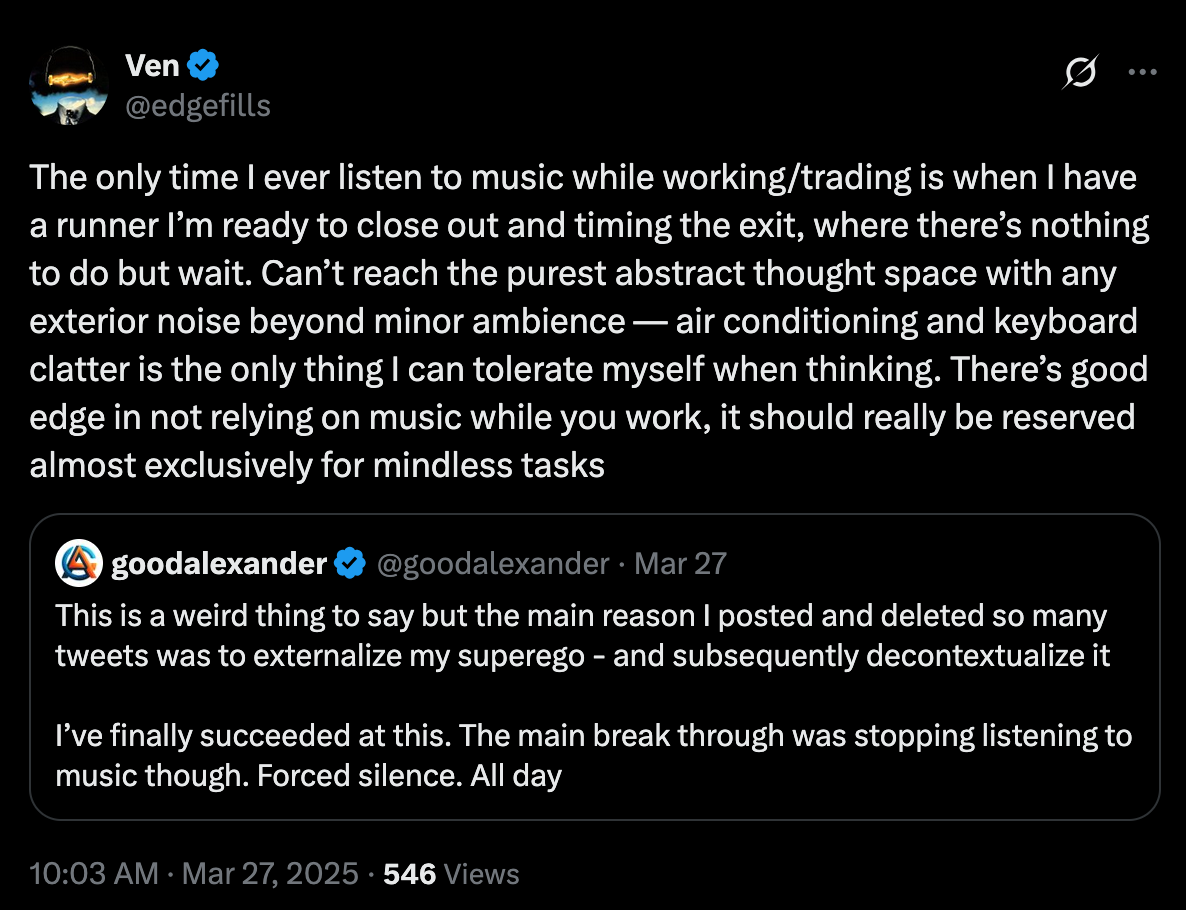
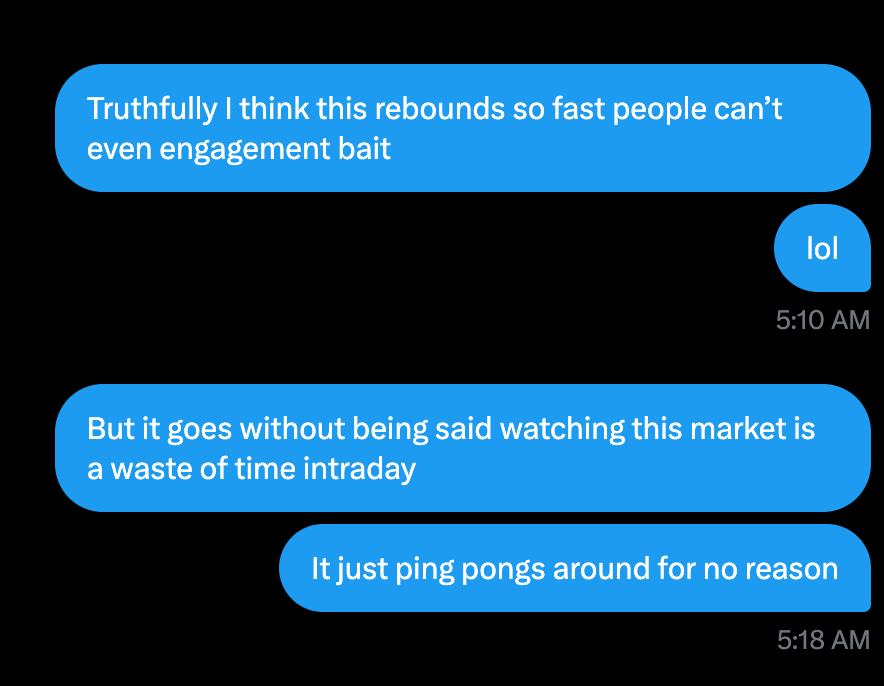
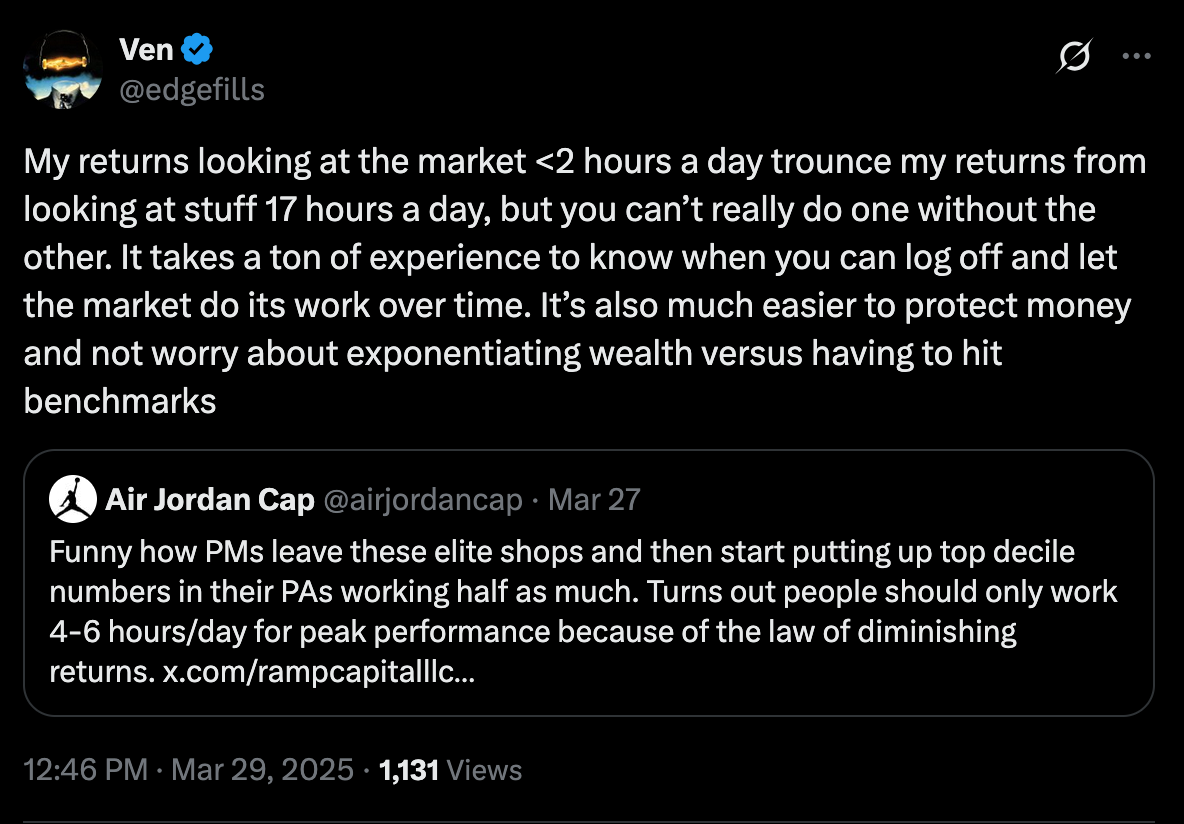
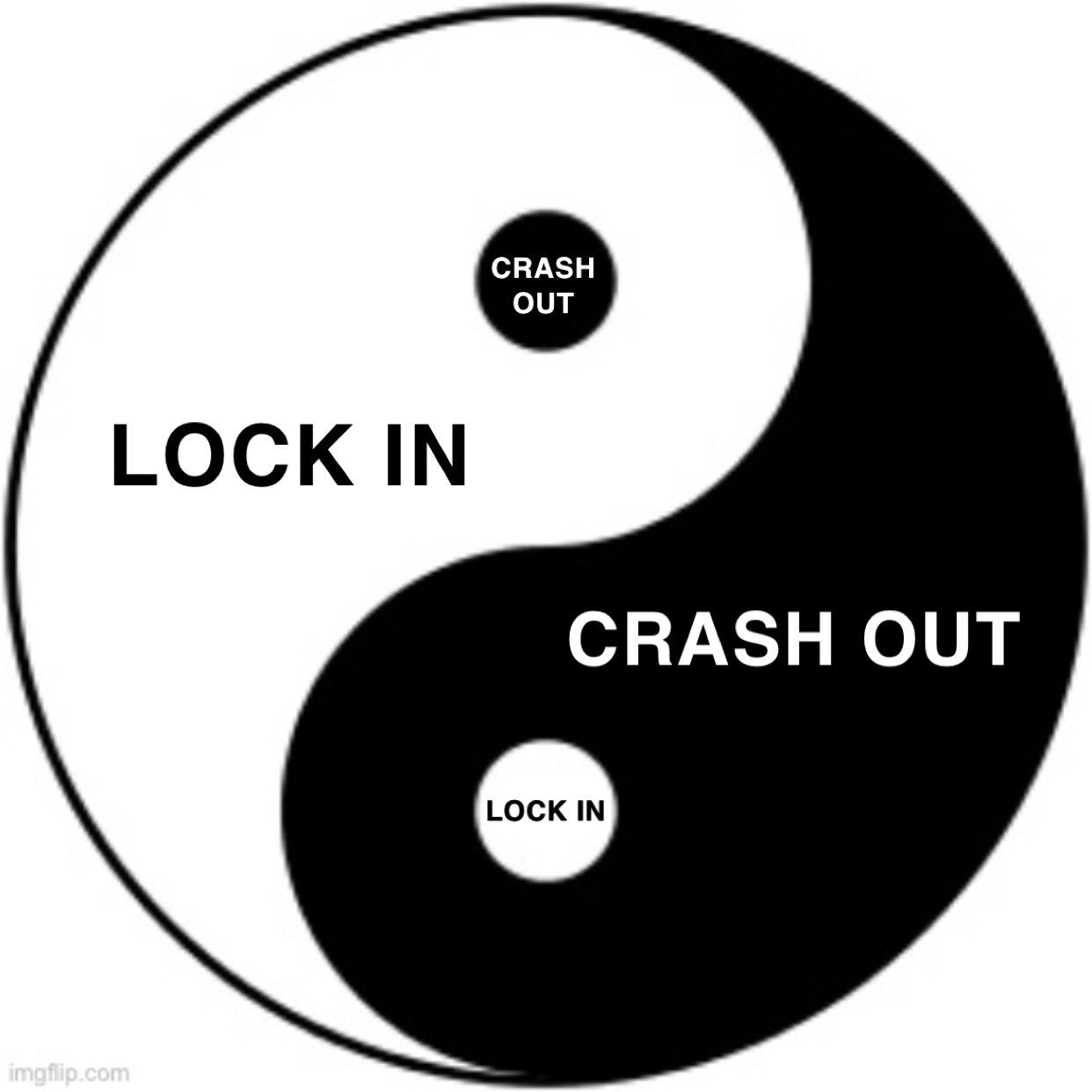
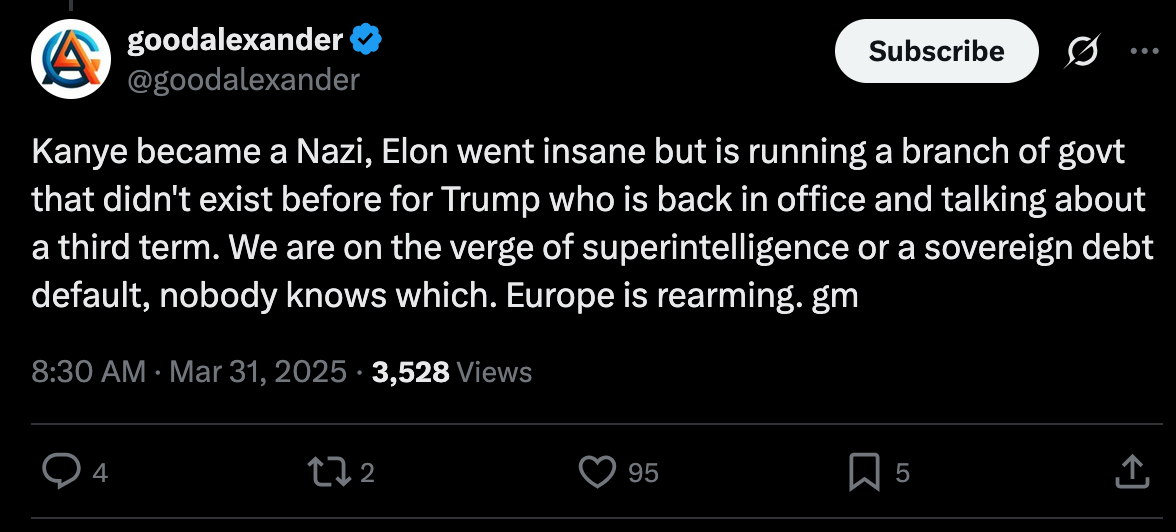
Do you ever listen to Manchester Orchestra? Listen to "I've got friends" and then "I know how to speak", they span a long career. It's funny watching people you don't know grow up.